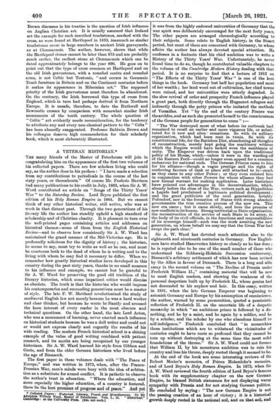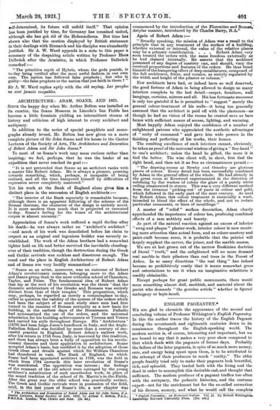A VETERAN HISTORIAN.*
Taz many friends of the Master of Peterhouse will join in congratulating him on the appearance of the fast two volumes of his collected papers. There are few scholars living who could say, as the author does in his preface : " I have made a selection from my contributions to periodicals in the course of the last sixty years, or thereabouts." Of course Mr. Frederic Harrison had many publications to his credit in July, 1863, when Sir A. W. Ward contributed an article on " Songs of the Thirty Years' War" to the Saturday Review. Lord Bryce published the first edition of his Holy Roman Empire in 1864. But we cannot think of any other historical writer, still active, who was at work in that distant past. Through the two generations of his literary life the author has steadily upheld a high standard of scholarship and of Christian charity. It is pleasant to turn over the well-printed pages containing articles and addresses on historical themes—some of them from the English Historical Review—and to observe how consistently Sir A. W. Ward has maintained the grand manner of the Mid-Victorian age. He is profoundly solicitous for the dignity of history ; the historian, he seems to say, must try to write as well as he can, and must be courteous both to the dead of whom he is writing and to the living with whom he may find it necessary to differ. When we remember how greatly historical studies have developed in this country during the past sixty years, thanks in no small measure to his influence and example, we cannot but be grateful to Sir A. W. Ward for preserving the good old tradition of the literary historian, which some impatient critics would dismiss as obsolete. The truth is that the historian who would impress his contemporaries and succeeding general ions must be a master of style. The late F. W. Maitland revolutionized the study of mediaeval English law not merely because Le was a hard worker and clear thinker, but because he wrote br.11iantly and aroused the keen interest of every reader in the most obscure and technical questions. On the other hand, the late Lord Acton, who was a monument of learning, never exerted much influence on historical students because he was a dull writer and could not or would not express clearly and cogently the results of his wide reading. The modern French historical school is a shining
example of the value of good writing combined with patient research, and its merits are being recognized by our younger historians. Sir A. W. Ward learned his style from Gibbon and Grote, and from the older German historians who lived before the age of Bismarck.
The first paper in these volumes deals with " The Peace of Europe," and was written in 1873, when, after the Franco- Prussian War, men's minds were busy with the idea of arbitra- tion as a substitute for armed conflict. It is pathetic to observe the author's trust in education. " Where the education, and
more especially the higher education, of a country is fostered, there lie the best promises of progress and of peace." And yet • Collected Papers: Historical, Literary. Treed. and Miscellaneous. By Sir Adolphus William Ward. Master of Feterbonse. Vols. I., II. " Historical." Cambridge : at the University Preis. 1241. net each.]
it was from the highly endowed universities of Germany that the
war spirit was deliberately encouraged for the next forty years. The other papers are arranged chronologically according to their subjects. Some relate to English history; in the Stuart period, but most of them are concerned with Germany, to whose
affairs the author has always devoted special attention. He confesses in a footnote that his chief ambition was to write a History of the Thirty Years' War. Unfortunately, he never found time to do so, though he contributed valuable chapters to the volume of the Cambridge Modern History dealing with that period. It is no surprise to find that a lecture of 1912 on " The Effects of the Thirty Years' War " is one of the beat things in the book. Germany lost half her population and most of her wealth ; her land went out of cultivation, her chief towns were ruined, and her universities were utterly degraded. In the slow revival of order and prosperity French influence played
a great part, both directly through the Huguenot refugees and indirectly through the petty princes who imitated the methods
of Versailles. Yet " by the end of the century France was thearchfoe,and as such she presented herself to the consciousness of the German people for generations to come " :-
" The War destroyed most of what before its outbreak had remained to recall an earlier and more vigcan- us life, or substi- tuted for it new and alien'. ormations. So with its military organization, which had been rent in twain. So with its constitutional life, for the Ratisbon Diet, abandoning all thoughts of reconstruction, merely kept going the machinery without which the Empire would have lacked even the semblance of unity. The Emperor was driven back upon the traditional policy of his House, which—unless it were in the warding-off of the Eastern Peril—could no longer even appeal for a common endeavour for national ends. The German Princes came to him for his alliance—though a vague prestige and the right of conferring favours of rank or place still attached to it—much as they came to any other Power ; or they even resisted him in conjunction with other Powers for whose alliance they had now formal warrant for making application. Later historians have pointed out advantages in the decentralization, which, already before the close of the War, writers such as Hippolithus a Lapide had proclaimed a legitimate political development ; and the great publicists of the next generation, notably Pufendorf, saw in the formation of States with strong absolute governments the true creative process of the new era. This new era came ; but it came slowly, and bore the promise of new conflicts in its bosom. Strong territorial or State organization, the reconstruction of the service of each State in its army, in the body of its civil officials, in the functions and responsibilities of its sovereign himself—such was the work awaiting the new generation, on whose behalf we may say that the Great War had swept the path clear."
Sir A. W. Ward has devoted much attention also to the eighteenth and nineteenth centuries in Germany. Few English-
men have studied Hanoverian history so closely as ho has done ; he is reputed also to be one of the small number of those who understand the Schleswig-Holstein Succession controversy, Bismarck's arbitrary settlement of which has now been revised by the Allies in favour of Denmark. There is a long and able essay in the second volume on " The Decline of Prussia under Frederick William U.," containing material that will be new
to most English readers, and showing the weakness of the personal despotism built up by Frederick IL, whose genius had not descended to his nephew and heir. In this essay, written in 1891, when the late German Emperor was beginning to astonish Germany and Europe by his assumption of omniscience, the author, warned by some premonition, quoted a pessimistic reflection of Frederick IL on the uncertain life of a despotic
monarchy in which " an ambitious prince is followed by a do- nothing, and he by a saint, and he again by a soldier, and he by a scholar, and the scholar by one who abandons himself to self-indulgence." Frederick concluded that " in monarchies those institutions which are to withstand the vicissitudes of centuries ought to have roots so profound that they cannot be torn up without destroying at the same time the most solid foundations of the throne." Sir A. W. Ward could not foresee that William IL by his monstrous ambition was to ruin his country and lose his throne, deeply rooted though it seemed to be. At the end of the book are some interesting reviews of Sir Robert Morier's memoirs, of Prince Hohenlohe's memoirs, and of Lord Bryce's Holy Roman Empire. In 1873, when Sir
A. W. Ward reviewed the fourth edition of Lord Bryce's famous book with its supplementary chapter on the new German Empire, he blamed British statesmen for not displaying warm sympathy with Prussia and for not studying German politics. He concluded by saying : " The new German Empire is not the passing creation of an hour of victory ; it is a historical growth deeply rooted in the national soil, and on that soil, and self-determined, its future will unfold itself." That opinion has been justified by time, for Germany has remained united, although she has got rid of the Hohenzollerns. But time has shown also that the caution displayed by British statesmen in their dealings with Bismarck and his disciples was abundantly justified. Sir A. W. Ward appends in a note to this paper a summary of the despairing article written by Professor Hans Delbrfick after the Armistice, in which Professor Delbrfick remarked :—
"The primitive myth of Hybris, whom the gods punish, is to-day being verified after the most awful fashion in our own case. The nation has followed false prophets ; but who is guilty—the false prophets or the nation that put faith in them ? "
Sire W. Ward replies aptly with the old saying, Les peoples ne sent jamais coupables.



































 Previous page
Previous page